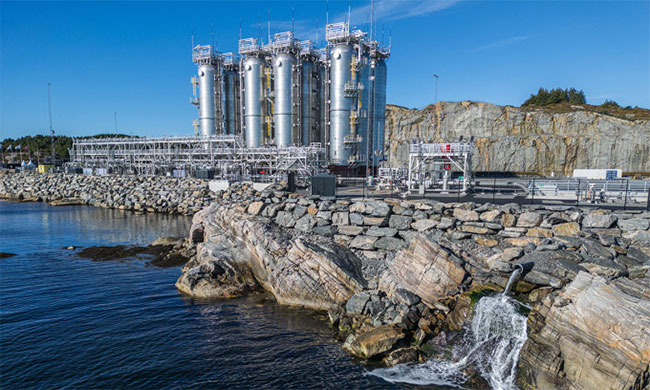World's first commercial CO2 storage service
Norway on September 26 inaugurated the "gateway" to a giant CO2 storage facility, moving towards opening the first commercial CO2 transport and storage service .
The Northern Lights commercial CO2 transport and storage project in Norway aims to capture CO2 emissions from European factory chimneys and pump them into geological reservoirs under the sea. The aim is to prevent the emissions from entering the atmosphere , thereby helping to prevent climate change.

CO2 transport and storage facility on Oygarden Island. (Photo: Jonathan Nackstrand/AFP).
The newly inaugurated 'Gateway' is actually a facility on Oygarden Island with 12 giant, shiny storage tanks. Pipes run around the tanks, including one that leads into the North Sea. The CO2 from the tanks will travel through 110km of pipeline before being pumped to the seabed, some 2.6km deep, for permanent storage. The North Sea, with its depleted oil and gas fields and vast network of pipelines, is an ideal place to bury greenhouse gases.
The Oygarden Island facility, jointly operated by Equinor (Norway), Shell (UK-Netherlands) and TotalEnergies (France), is expected to capture the first batch of CO2 in 2025. The facility will have an initial capacity of 1.5 million tons of CO2 per year, increasing to 5 million tons in the second phase if there is strong market demand.
'Northern Lights is a demonstration project that shows that carbon capture and storage (CCS) is a technically feasible solution ,' said project director Tim Heijn, adding that it is a tool that can help combat climate change.
CCS technology is complex and expensive but has been advocated by the United Nations (UN) Intergovernmental Panel on Climate Change (IPCC) and the International Energy Agency (IEA), particularly to help reduce CO2 emissions from industries such as cement and steel, which are difficult to decarbonize.
Global CO2 capture capacity is currently just 50.5 million tonnes, or about 0.1% of the world's total annual emissions, according to the IEA. To limit global warming to 1.5°C above pre-industrial levels, CCS would have to prevent at least a billion tonnes of CO2 from entering the atmosphere each year by 2030. However , the technology is still in its infancy and is being developed slowly due to its high costs. The Norwegian government has funded 80% of the total cost of the Northern Lights project.
- Skype added ringtone service
- AOL offers 50GB online storage
- AOL stops providing a wide range of services
- Yahoo Mail will increase unlimited storage
- Time to finish for DVD?
- Microsoft enters the market
- Effective online data storage service
- Seagate launches a new storage solution
- Important Google Photos changes you need to know
- The first vapor film in the world
- The truths always amaze you about the biological world
- Microsoft revealed about Live Drive online drive
 Is the magnetic North Pole shift dangerous to humanity?
Is the magnetic North Pole shift dangerous to humanity? Washington legalizes the recycling of human bodies into fertilizer
Washington legalizes the recycling of human bodies into fertilizer Lightning stone - the mysterious guest
Lightning stone - the mysterious guest Stunned by the mysterious sunset, strange appearance
Stunned by the mysterious sunset, strange appearance Permafrost seed bank
Permafrost seed bank  How to free up Gmail, Google Drive storage is full
How to free up Gmail, Google Drive storage is full  Super capacitor still works after 40 times being hit by hammer
Super capacitor still works after 40 times being hit by hammer  Unexpected discovery: Salmon not only to eat!
Unexpected discovery: Salmon not only to eat!  California bottled sunshine
California bottled sunshine  For the first time Germany stores CO2 into the ground
For the first time Germany stores CO2 into the ground 